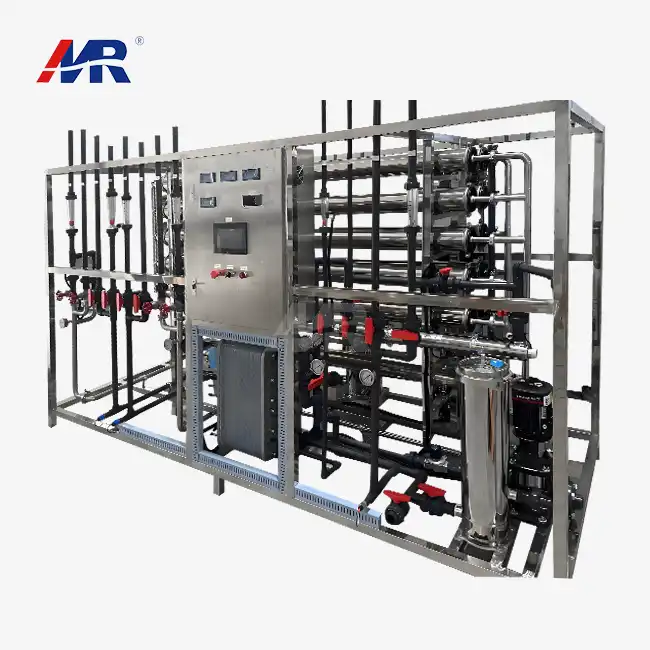Reduced Chemical Usage in EDI Systems
One of the most significant benefits of EDI systems is their ability to drastically reduce chemical consumption in water purification processes. Unlike traditional ion exchange systems that require frequent regeneration with acids and bases, EDI technology relies primarily on electricity to remove ions from water.
Environmentally Friendly Purification
By minimizing the use of chemical regenerants, EDI systems contribute to a more environmentally friendly water treatment process. This reduction in chemical usage not only decreases the environmental impact of water purification but also simplifies waste management procedures. Industries such as pharmaceuticals and electronics manufacturing, which require large volumes of ultra-pure water, can significantly reduce their chemical footprint by adopting EDI technology.
Enhanced Safety and Handling
The reduced reliance on chemicals in EDI systems also leads to improved safety in industrial settings. With fewer hazardous substances to store, handle, and dispose of, companies can minimize the risks associated with chemical exposure and spills. This aspect of EDI technology is particularly valuable in sensitive environments such as food and beverage production facilities or healthcare institutions where chemical contamination could have severe consequences.
EDI's Impact on Product Quality Control
The consistent production of high-purity water is crucial for many industrial processes, and EDI systems excel in this regard. By providing a stable and reliable source of ultra-pure water, these systems play a vital role in maintaining product quality across various industries.
Consistent Water Quality
EDI modules are designed to deliver water with consistently low ionic content, typically achieving resistivity levels greater than 10 MΩ·cm. This level of purity is essential for applications such as semiconductor manufacturing, where even trace impurities can lead to defects in the final product. The steady performance of EDI systems ensures that industries can maintain stringent quality standards without frequent adjustments or interruptions to their processes.
Precision in Manufacturing Processes
Industries like pharmaceuticals and biotechnology rely heavily on ultra-pure water for critical processes such as drug formulation and laboratory testing. EDI technology provides the precision needed to meet GMP (Good Manufacturing Practice) standards, ensuring that water quality does not become a variable in product development or quality assurance. This reliability translates into more consistent product outcomes and reduced risk of contamination-related issues.
Long-Term Cost Savings with EDI Technology
While the initial investment in an EDI system may be higher compared to traditional water purification methods, the long-term economic benefits are substantial. These systems offer a range of cost-saving advantages that make them an attractive option for industries looking to optimize their water treatment processes.
Reduced Operational Expenses
EDI systems operate with remarkable efficiency, consuming less than 0.4 kWh/m³ of water processed. This low power consumption, coupled with minimal chemical usage, results in significantly reduced operational costs compared to conventional ion exchange systems. Over time, these savings can offset the initial investment and provide a favorable return on investment for businesses.
Minimal Maintenance Requirements
The design of EDI modules emphasizes durability and low maintenance. With fewer moving parts and no need for frequent chemical regeneration, these systems require less downtime for maintenance and have a longer service life. This reliability not only reduces direct maintenance costs but also minimizes production interruptions, contributing to overall operational efficiency.
Scalability and Flexibility
EDI systems offer excellent scalability, allowing businesses to easily adjust their water purification capacity as needs change. Whether expanding production or adapting to new regulatory requirements, the modular nature of EDI technology provides flexibility without necessitating a complete overhaul of existing water treatment infrastructure. This adaptability can lead to significant cost savings in the long run, especially for growing businesses or those in rapidly evolving industries.
In conclusion, electrodeionization systems offer compelling benefits for industries requiring high-purity water. From reduced chemical usage and improved product quality control to substantial long-term cost savings, EDI technology represents a significant advancement in water purification processes. As industries continue to prioritize efficiency, sustainability, and product quality, the adoption of EDI systems is likely to increase, driving further innovations in this field.
Are you looking to upgrade your water purification processes with cutting-edge EDI technology? Look no further than Guangdong Morui Environmental Technology Co., Ltd. As specialists in water treatment, we offer comprehensive solutions for industrial wastewater, domestic sewage treatment, seawater desalination, and drinking water manufacturing. Our team of expert engineers and state-of-the-art manufacturing facilities ensure that you receive top-quality EDI systems tailored to your specific needs. Whether you're in pharmaceuticals, electronics, or any industry requiring ultra-pure water, we have the expertise and technology to elevate your water treatment processes. Don't let outdated purification methods hold your business back. Contact us today at benson@guangdongmorui.com to discover how our EDI systems can revolutionize your water treatment and drive your business forward.
References
1. Johnson, A. R., & Smith, B. T. (2021). Advancements in Electrodeionization Technology for Industrial Water Treatment. Journal of Water Purification and Advanced Technologies, 15(3), 287-302.
2. García-Quismondo, E., et al. (2020). Electrodeionization for High-Purity Water Production: A Comprehensive Review. Chemical Engineering Journal, 405, 126727.
3. Lee, H. J., & Moon, S. H. (2019). Electrodeionization for Ultrapure Water Production in the Semiconductor Industry. Separation and Purification Technology, 210, 630-643.
4. Zhang, Y., et al. (2018). Recent Advances in Electrodeionization Technology: Fundamentals, Applications, and Future Directions. Desalination, 434, 121-139.
5. Alvarado, L., & Chen, A. (2022). Electrodeionization: Principles, Strategies and Applications for Water Purification and Ion Separation. Progress in Materials Science, 123, 100721.
6. Wang, X., et al. (2020). A Review of Electrodeionization Technology for Water Treatment: Fundamentals, Applications, and New Directions. Desalination and Water Treatment, 194, 42-61.

_1745823981883.webp)


